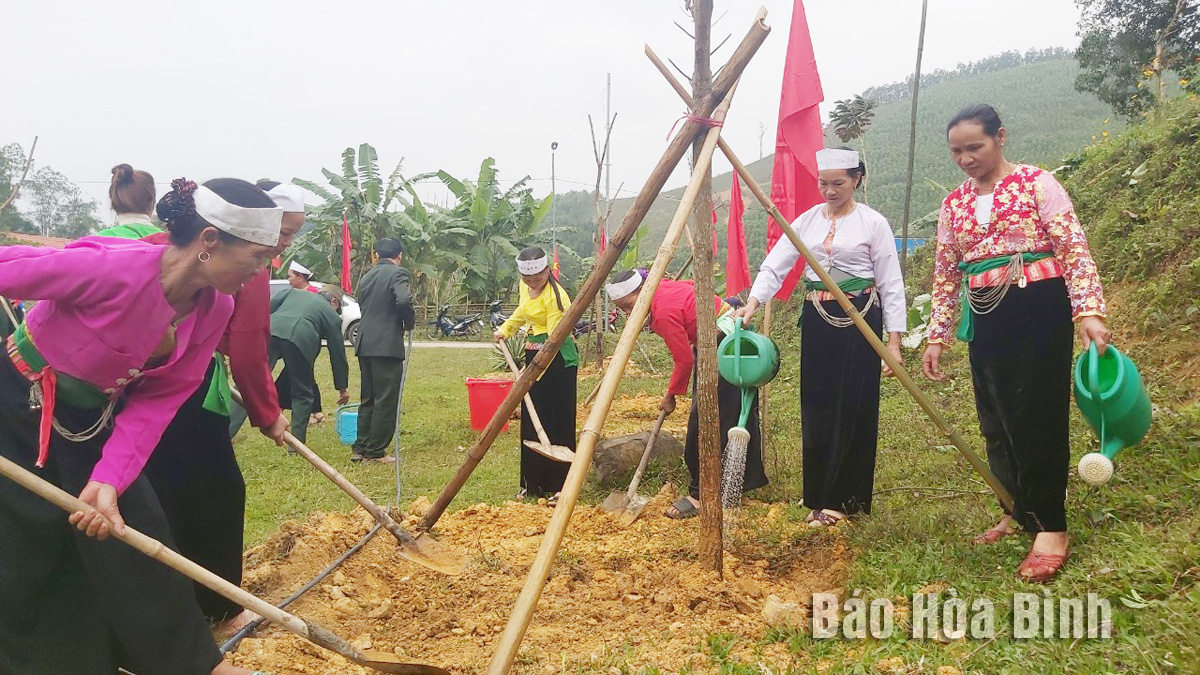



The people of Lac Sy commune, Yen Thuy district have been participating in planting trees at the launching ceremony of Tree Planting Festival "Being eternally grateful to Uncle Ho” in the Dragon Spring, Giap Thin , in 2024.
In 2023, implementing the plan of afforestation and scattered tree planting, the whole province has planted concentrated forests on 8,166.06 hectares/5,530 hectares (reaching 147.67%); Planting the scattered trees, 942,220 trees / 906,200 trees (reaching 104%). During the year, the province produced over 22 million seedlings of all kinds to serve the afforestation plan (reaching 138.35%). The forest care, zoning and protection continue to receive the attention, the forest coverage rate remains stable at over 51.5% (currently reaching 51.69%). In addition, the whole province over 8,480 hectares of concentrated planted forests with 682,038.48 m3 of wood has been exploited in the wjole provimnce; the scattered trees have been exploited, reaching more than 20,280 m3 of wood; nearly 375,198 ste of firewood; 3,484,900 bamboos, schizostachym aciculate, debdrocalamus barbatus and bamboo maclurochloa trees; over 9,450 tons of fresh bamboo shoots; nearly 1,168 tons of medicinal materials; 4,525 kg of wild honey... The total income from forests of the organizations and the households in the entire province is estimated at over 931,679 million VND.
Also in 2023, the agricultural sector has coordinated to closely monitor the projects converting forest and forestry land to other purposes, ensuring the compliance with regulations. In the province, there are 13 projects approved by the Provincial People's Council with the policy of converting forests to other purposes with an area of 209.39 hectares outside the planning of three types of forests, the current status includes 141.95 hectares of planted forests, 67.44 hectares hectares without forest. They have been maintaining the existing forest certified area, continuing to promote the area of FSC certified forests in the province.
According to the plan, by 2024, the whole province will have planted 5.7 thousand hectares of concentrated forests, 906 thousand scattered trees, taking care for and protecting 100% of the existing planted forest area, and increasing the income for the employees in the forestry profession. They aretrying to maintain the stable forest coverage of over 51.5%. Mr. Nguyen Huy Nhuan, the Director of the Department of Agriculture and Rural Development, says: To realize the set goals and plans, the sector is determined to continue implementing the project for the Forestry Restructuring in the angricultural sector and the Target Program for the sustainable Forestry Development. It is necessary to maintain and expand the area of the sustainable forest management certification. They have suggested strictly implementing the Government's policy of closing the natural forests. It is also important to continue encouraging and supporting the planting of large timber forests, planting the forests with FSC certification, planting the native timber trees and non-timber forest products. It is necessary to continue improving and effectively implementing the policies on the payment for forest environmental services in the province.
In particular, to ensure the replacement afforestation areas, the agricultural sector has directed the Forest Protection Department to proactively coordinate with the local authorities throughout the process of implementing afforestation and replacement afforestation, from the planning stage to the stage of planting, caring, managing and protecting plans. The evaluation and acceptance of each part must involve the participation of district-level specialized agencies. They regularly exchange the relevant information in order to coordinate and promptly intervene with the appropriate authorities when the cases of forest area encroachment or forest land disputes take place... the task of propaganda and mobilization of people have weel done, and the people understand and support the policy of afforestation. They have organized an overall assessment of the area where the replacement forests have been planted. For the areas with the low rate of tree survival and the ineffective development, and the unsuitable natural and soil conditions, the maple trees need to be urgently replanted, which are suitable to ensure the density according to the technical design and the uniform growth among the different types of trees on the same area.
For the areas taht are about to be afforested, the agricultural sector directs the localities to conduct the surveys, select the locations and prepare the design documents to ensure the compliance with the regulations, with a focus on surveying and carefully assessing the current situation and the fieldwork to develop new planting plans or zoning with additional planting; avoiding the situation of arranging the agricultural land to overlap with the people's long-standing production land; Prioritizing the selection of indigenous tree varieties with good growth ability and adaptability to the natural and soil conditions; At the same time, it is necessary to meet the objectives of the replacement forest after it becomes a forest.
They have been paying attention to the stage of selecting seedlings, ensuring quality, standards, origin, and having a certificate of origin for the batch of seedlings issued by the state management agency. The training classes have been organized to improve knowledge and skills in planting and caring for forests for the employees. There are the fundamental solutions, implementing good management and protection work to promptly prevent destruction affecting the growth and development of the planted forests.